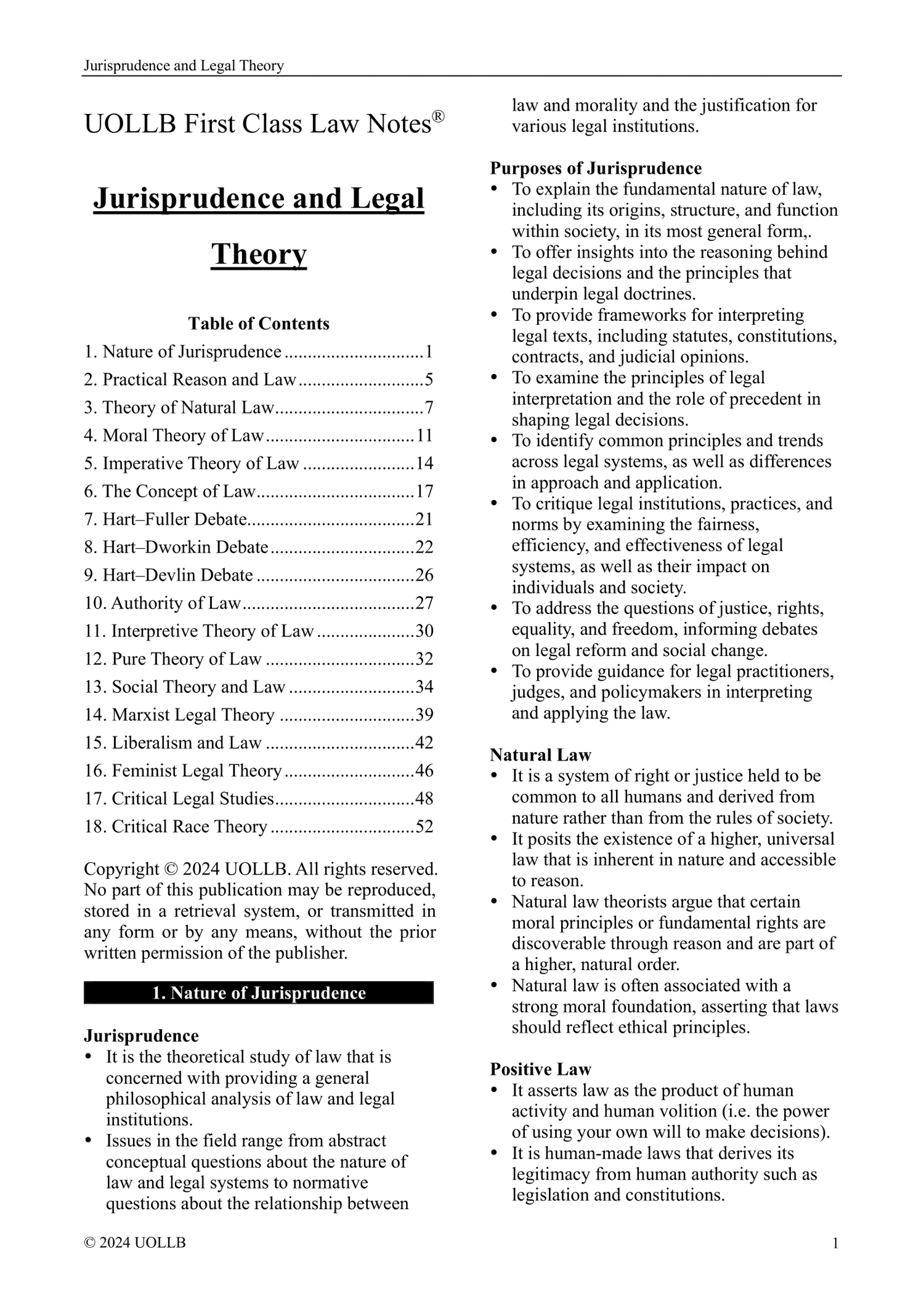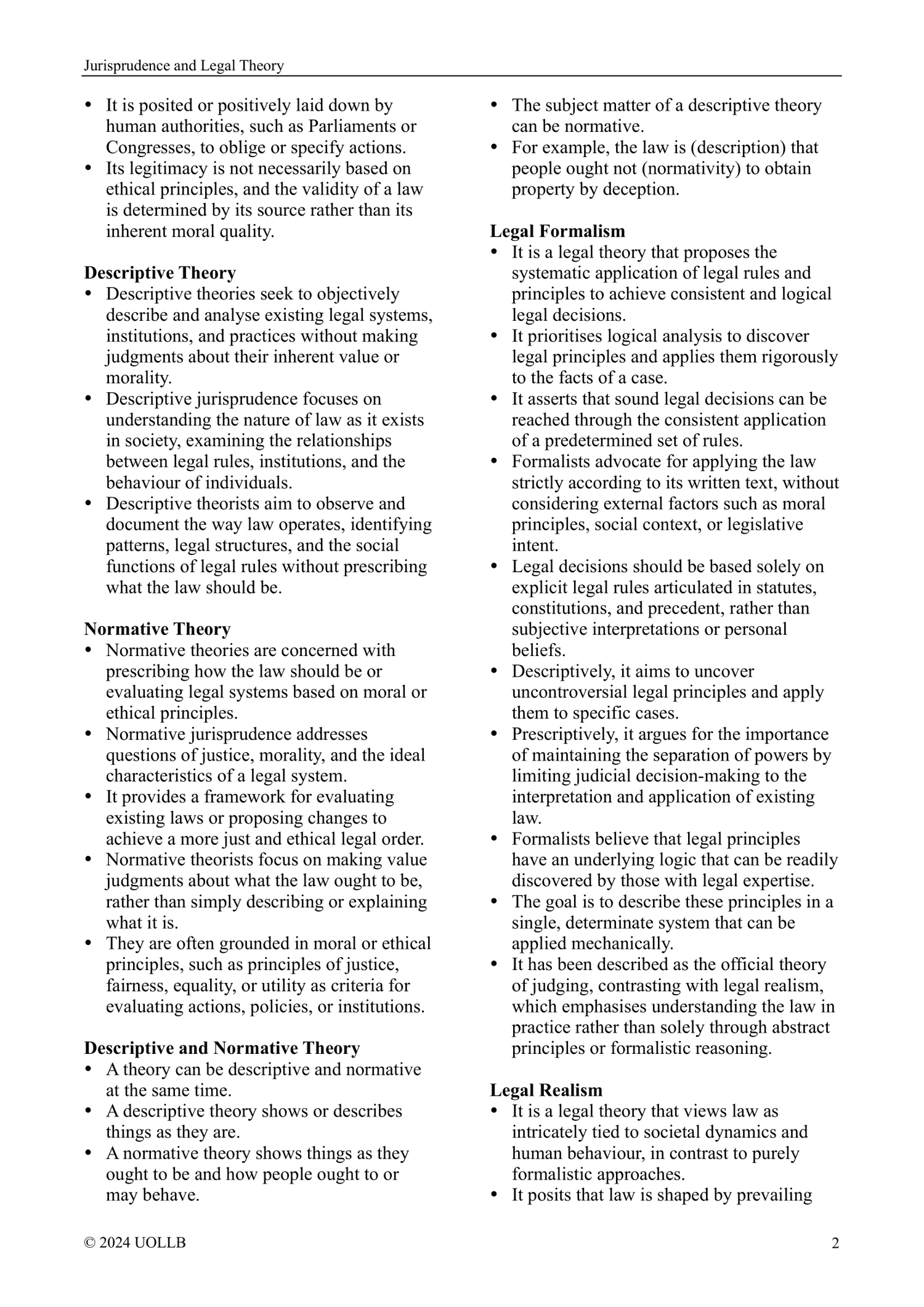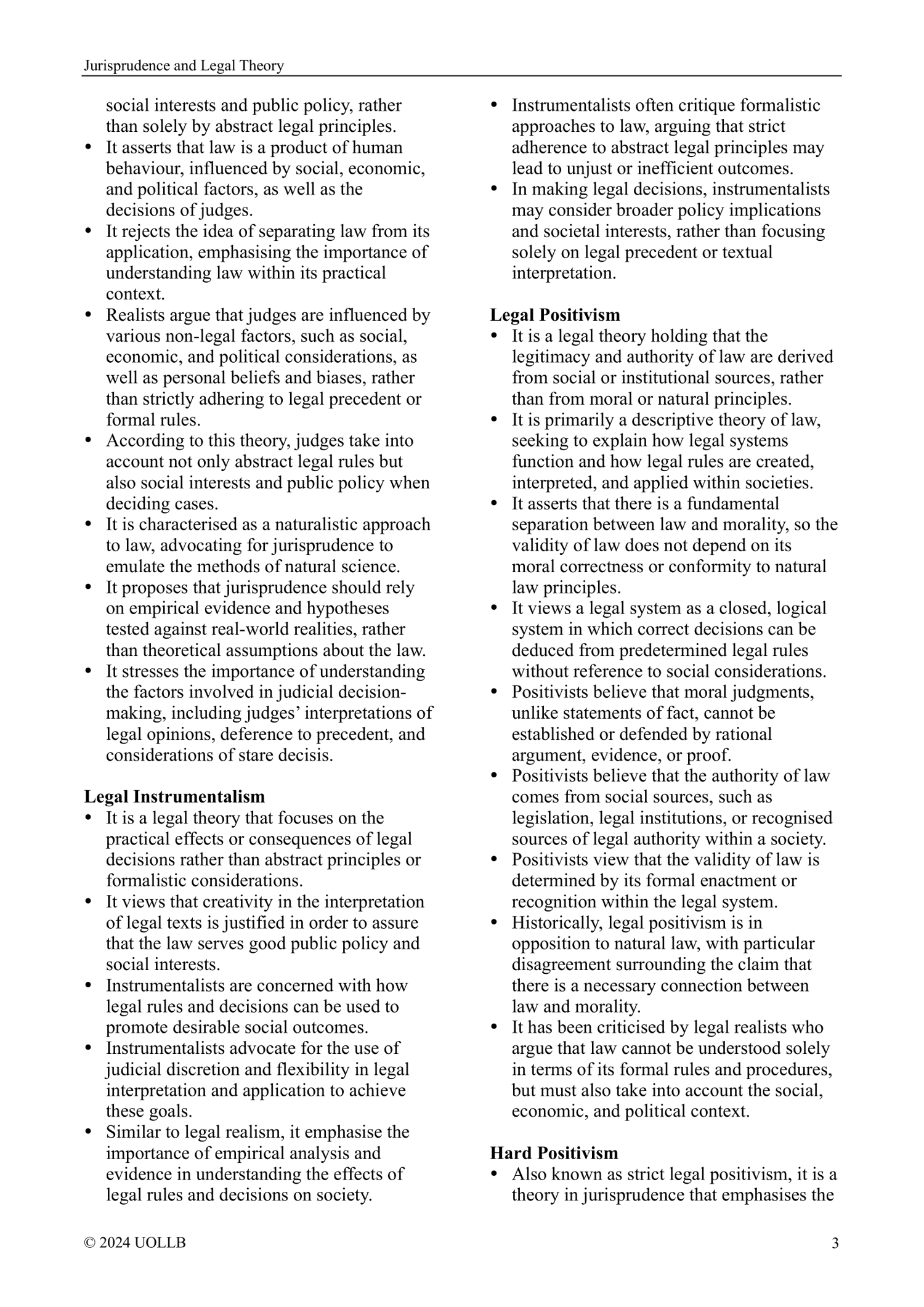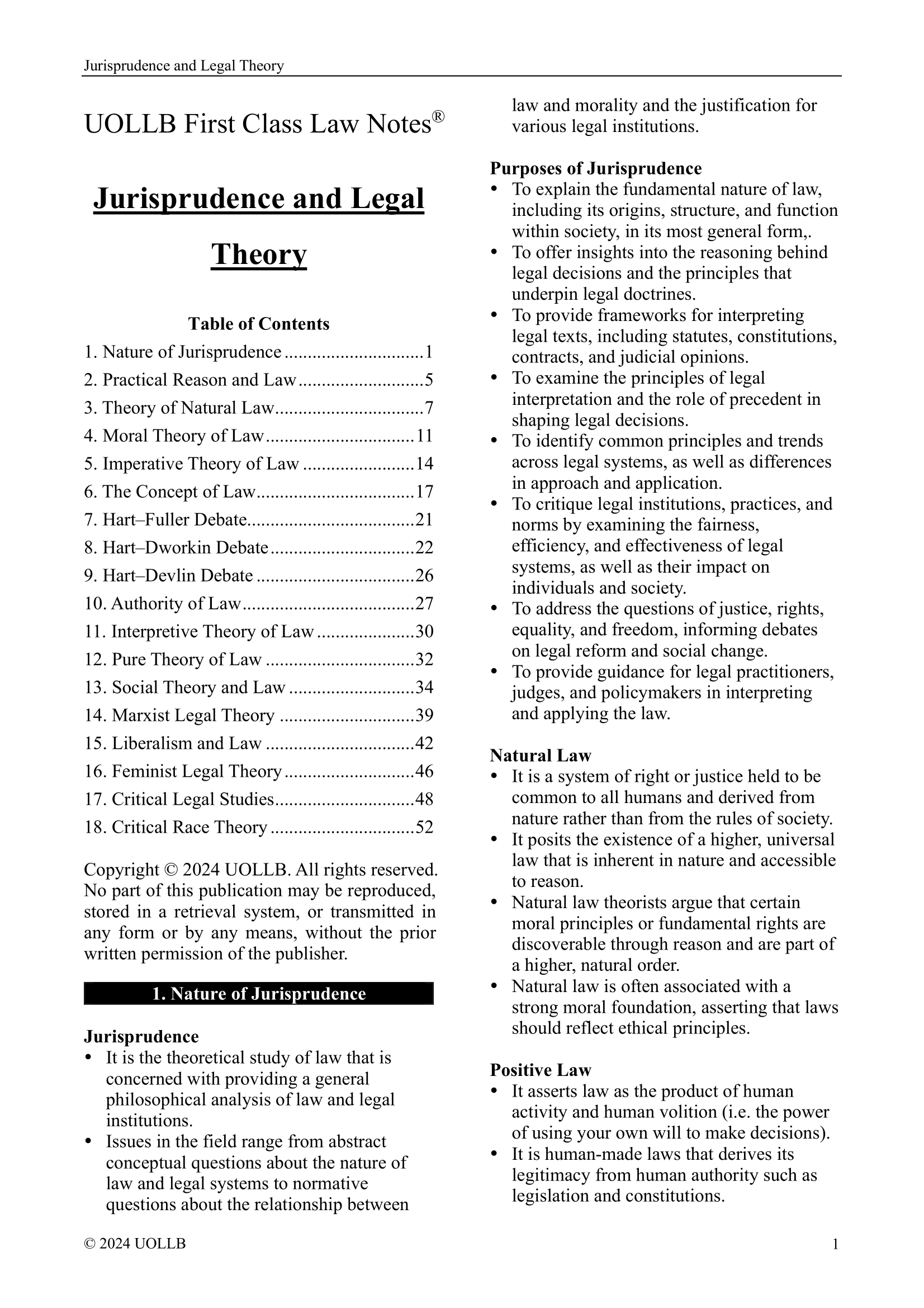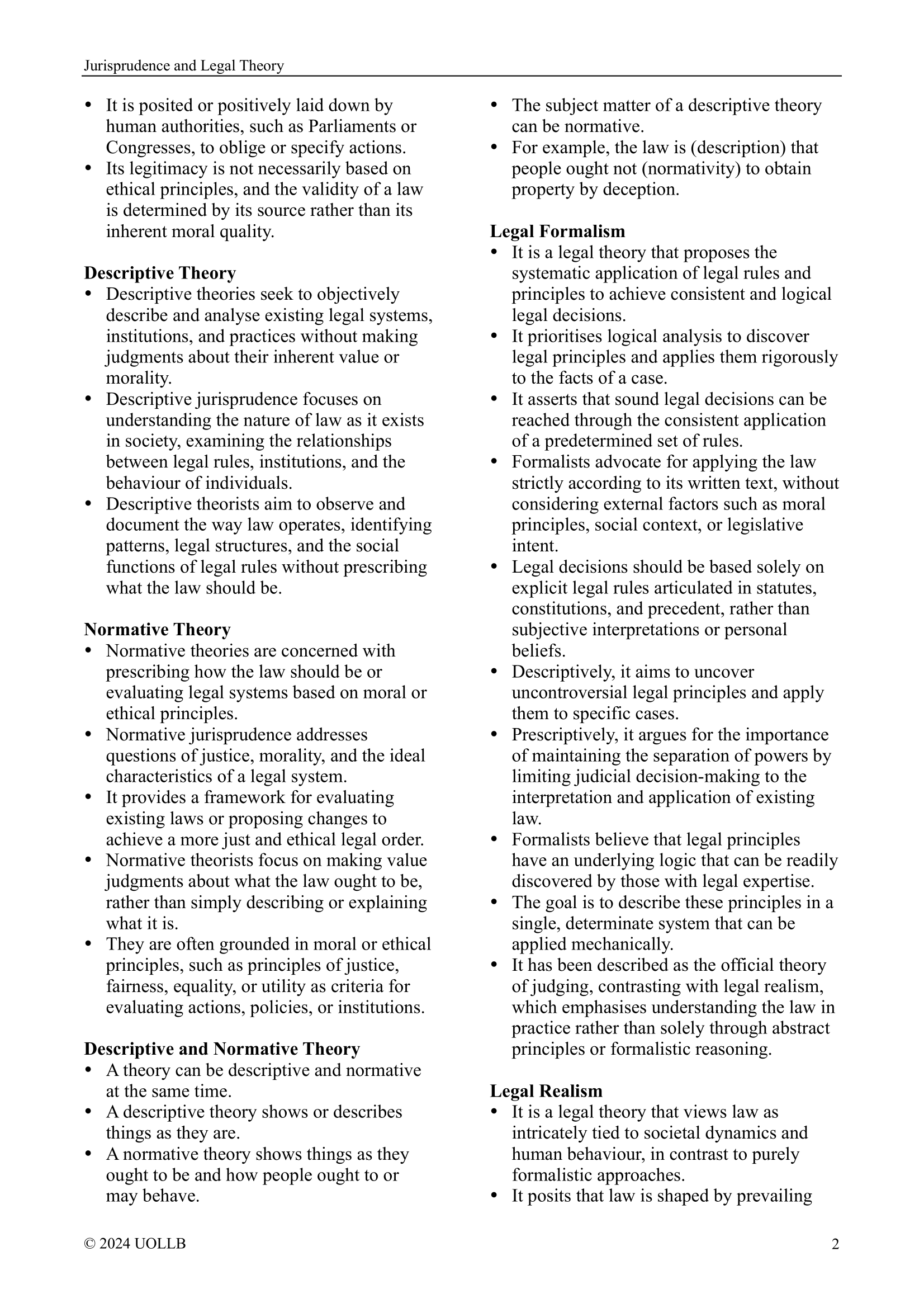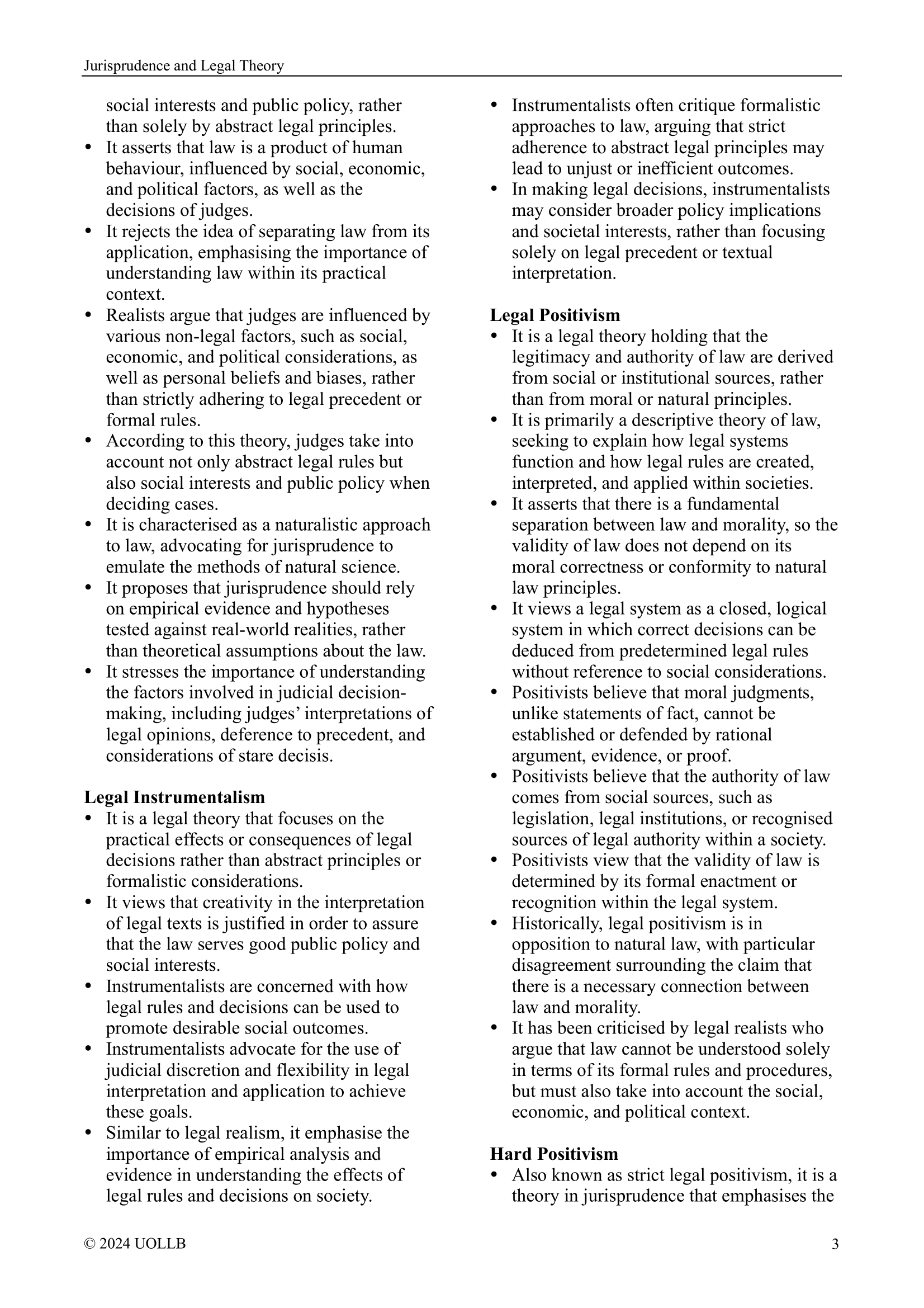Jurisprudence and Legal Theory examines the nature, purpose, and foundations of law, as well as the theoretical frameworks used to analyse and interpret legal concepts. It is a compulsory module you have to study in Year 3, though it is not assessed in SQE, nor is it required for entry into bar training. Here is a summary of the topics covered in this module.
The Nature of Jurisprudence: Jurisprudence is a branch of philosophy that seeks to understand the nature, purpose, and principles of law. It explores the fundamental questions about law, legal systems, and the role of law in society. Jurisprudence examines legal concepts, theories, and the underlying principles that shape the development and application of law.
Subject Matter of Jurisprudence: The subject matter of jurisprudence encompasses a wide range of topics related to law and legal systems. It delves into questions such as the nature of law, the relationship between law and morality, the concept of justice, legal reasoning and interpretation, the sources of law, the role of judges and legal institutions, and the study of legal concepts and doctrines.
Philosophical Method of Jurisprudence: Jurisprudence employs various philosophical methods to analyse and understand the nature of law. These methods include conceptual analysis, logical reasoning, critical examination of legal doctrines and concepts, historical analysis of legal systems, comparative analysis of different legal traditions, and interdisciplinary approaches that draw on insights from other fields such as sociology, ethics, and political philosophy.
Analytical Philosophy of Jurisprudence: Analytical jurisprudence is a prominent approach within jurisprudence that focuses on the logical analysis of legal concepts, language, and reasoning. It seeks to clarify the meaning of legal terms, explore the structure of legal arguments, and evaluate the coherence and consistency of legal doctrines. Analytical jurisprudence often emphasises the importance of clear definitions, logical consistency, and rigorous analysis in understanding and evaluating legal principles.
Natural Law Theory: Natural law theory is a school of thought within jurisprudence that posits the existence of universal moral principles that govern human conduct and are discoverable through reason. According to natural law theory, there is a higher law or moral order that transcends positive law (man-made law) and serves as a standard by which positive laws should be judged. Natural law theorists argue that laws should be based on principles of justice, fairness, and inherent human rights. Natural law theory holds that certain fundamental rights and moral principles are inherent to human nature and should be protected and upheld by legal systems. It emphasises the connection between law and morality, suggesting that law should reflect moral truths and promote the common good. Natural law theory has been influential in shaping legal systems and the development of legal principles, particularly in areas where legal and moral considerations intersect.
Critics of Natural Law Theory: Natural law theory has faced various criticisms throughout history. Some of the key criticisms include:
- Cultural relativism: Critics argue that natural law theory is based on the assumption of universal moral principles, which may not be applicable or accepted in different cultural or historical contexts. They argue that moral values and norms vary across societies and that natural law theory fails to account for this cultural diversity.
- Lack of empirical basis: Critics claim that natural law theory relies on abstract philosophical concepts without a solid empirical foundation. They argue that moral principles cannot be derived solely from reason and that they are influenced by social and cultural factors.
- Overreliance on morality: Some critics argue that natural law theory places too much emphasis on moral considerations, often at the expense of other important aspects of law such as social utility, economic efficiency, and legal certainty. They argue that law should primarily serve practical purposes and address societal needs.
The History of Natural Law: The concept of natural law has a long history dating back to ancient Greek and Roman philosophy. Philosophers such as Aristotle and Cicero developed early notions of natural law based on the idea that there are universal principles inherent in nature that govern human conduct. The concept was further developed by medieval philosophers such as Thomas Aquinas, who incorporated Christian theology into natural law theory. During the Enlightenment period, natural law theory underwent significant developments. Thinkers like John Locke and Thomas Hobbes emphasised the natural rights and liberties of individuals, which they believed were derived from a state of nature. They argued that governments should be formed to protect these natural rights.
The Natural Law Theory of Fuller: Lon L. Fuller, a legal philosopher, developed a natural law theory known as the "inner morality of law." Fuller argued that for a legal system to be legitimate, it must meet certain internal criteria or principles, including generality, clarity, non-retroactivity, consistency, and congruence with social norms. He believed that adherence to these principles would ensure that a legal system serves its purpose of guiding human conduct and maintaining social order.
The Natural Law Theory of Finnis: John Finnis, a legal philosopher influenced by Aquinas, proposed a natural law theory known as the "new natural law theory." Finnis argued that there are seven basic goods inherent in human nature, such as life, knowledge, friendship, and religion. He believed that these goods provide a foundation for moral reasoning and that laws should promote and protect these goods. Finnis emphasised the importance of human dignity and the pursuit of a flourishing life in his natural law theory.
The Moral Theory of Law of Dworkin: Ronald Dworkin, a prominent legal philosopher, proposed a moral theory of law that challenged traditional positivist views. Dworkin argued that law should be understood as an interconnected system of principles, rights, and values that provide a moral framework for legal decision-making. He rejected the idea that law can be reduced to mere social facts or legislative commands and emphasised the importance of moral reasoning in judicial interpretation. Dworkin's theory focused on the concept of integrity, suggesting that judges should strive to maintain coherence and consistency in legal decisions by interpreting legal principles and values in a way that best fits the underlying moral framework of the legal system.
Legal Positivism: Legal positivism is a legal theory that emphasises the separability of law from morality and focuses on the existence of positive law as a product of human-made rules or commands. According to legal positivism, law is a social construct that derives its authority from recognised sources, such as legislation, judicial decisions, or customary practices. Legal positivists argue that the validity of law does not depend on its moral or ethical content but rather on its formal characteristics and the process by which it is created.
Critics of Legal Positivism: Legal positivism has faced several criticisms from various scholars and theorists. Some of the key criticisms include:
- Moral skepticism: Critics argue that legal positivism fails to account for the inherent moral dimensions of law. They contend that law cannot be completely divorced from moral considerations, as moral principles often shape legal systems and guide legal interpretation and decision-making.
- Inadequacy of legal validity: Critics claim that legal positivism's emphasis on formal sources of law overlooks the importance of substantive justice and moral legitimacy. They argue that a law can be technically valid according to legal positivism but still be morally unjust or oppressive.
- Historical and cultural context: Critics argue that legal positivism's focus on positive law disregards the historical and cultural context in which laws are created and interpreted. They contend that understanding the sociocultural factors that shape legal systems is essential for a comprehensive analysis of law.
Imperative Theory of Law: The imperative theory of law, associated with legal positivism, posits that laws are commands issued by a sovereign authority and backed by the threat of sanctions or punishment for non-compliance. According to this theory, law consists of authoritative commands that individuals are obligated to obey, regardless of their moral content or conformity to natural law principles.
Sanction Theory of Law: The sanction theory of law, also associated with legal positivism, holds that laws are rules enforced by sanctions or penalties for non-compliance. This theory emphasises that the efficacy of law depends on the enforcement mechanisms and the imposition of consequences for violating legal norms. It suggests that the presence of sanctions distinguishes legal rules from other social norms.
The Theory of Austin: John Austin, a legal theorist associated with legal positivism, proposed a theory of law based on the concept of sovereignty and command. According to Austin's theory, law is a command issued by a sovereign authority that is habitually obeyed by the majority of people. Austin focused on the external features of law, such as the command of a sovereign, as the defining characteristic of legal rules. Austin's theory emphasised the importance of legal rules being backed by sanctions and enforced through a centralised authority. However, his narrow focus on sovereign commands as the basis of law has been critiqued by later legal theorists who argue for a more nuanced understanding of legal systems.
The Theory of Kelsen: Hans Kelsen was a prominent legal theorist known for his Pure Theory of Law. According to Kelsen, law is a hierarchical system of norms that is derived from a basic norm, known as the Grundnorm. The Grundnorm serves as the foundational norm that gives validity and authority to the entire legal system. Kelsen emphasised the formal structure of law and sought to separate legal analysis from moral or political considerations. Kelsen's theory focused on the internal coherence and logical consistency of legal systems. He argued that legal norms are interconnected and create a self-sustaining legal order. Kelsen's theory has been influential in the field of legal positivism and has sparked debates about the nature of law and the relationship between law and morality.
Hart's Theory of Law: H.L.A. Hart proposed a legal theory known as the Concept of Law. Hart sought to refine and develop the positivist tradition by introducing the concept of the "rule of recognition." According to Hart, legal systems are based on a set of primary and secondary rules. Primary rules impose obligations and rights on individuals, while secondary rules establish the framework for creating, changing, and applying primary rules. Hart argued that the rule of recognition is a social rule that determines the criteria for identifying valid legal rules within a particular legal system. He emphasised the importance of social acceptance and recognition of legal norms as a basis for their validity. Hart's theory aimed to address some of the limitations of traditional legal positivism and provide a more sophisticated understanding of legal systems.
The Hart-Fuller Debate: The Hart-Fuller debate refers to a famous exchange between H.L.A. Hart and Lon L. Fuller regarding the nature of law and the role of morality within legal systems. The debate centred around the question of whether there are necessary moral constraints on the content of law. Hart argued that legal validity can be determined without reference to morality, emphasising the separability of law and morality. He proposed the concept of the internal morality of law, suggesting that legal systems have their own internal standards of legality and that moral judgments about the substance of the law are not essential for legal validity. Fuller, on the other hand, criticised Hart's positivist approach and argued that law inherently requires a connection to morality. He emphasised the importance of moral principles in shaping legal systems and argued that legal rules must meet certain moral standards, such as consistency and fairness, to be considered valid. The Hart-Fuller debate raised important questions about the relationship between law and morality, the role of judges in interpreting and applying the law, and the limits of legal positivism.
The Hart-Dworkin Debate: The Hart-Dworkin debate revolves around the ideas put forth by H.L.A. Hart and Ronald Dworkin regarding legal interpretation and the role of judges in adjudication. Hart argued for a more flexible approach to legal interpretation, emphasising the importance of judicial discretion and the application of legal rules. He believed that judges should have the freedom to exercise their judgment within the framework of legal rules and precedents. Dworkin, on the other hand, critiqued Hart's approach and proposed his own theory known as the principle-based approach or the law as integrity. Dworkin argued that judges should interpret and apply the law based on underlying principles and values that provide a coherent and morally justifiable framework for legal decision-making. He emphasised the importance of judicial reasoning and the moral dimension of legal interpretation. The Hart-Dworkin debate raised fundamental questions about the nature of legal interpretation, the role of principles in legal reasoning, and the relationship between law and morality in judicial decision-making.
Raz's Theory of Law: Joseph Raz is a legal philosopher known for his theory of legal positivism. Raz's theory centres on the concept of authority and the nature of legal systems. According to Raz, the key feature of law is its authority, which is derived from the normative system's ability to guide behaviour through legitimate directives. Raz argues that legal systems consist of primary and secondary rules. Primary rules impose obligations and create rights, while secondary rules provide the framework for the creation, modification, and application of primary rules. Raz introduces the concept of an "official hierarchy" as a criterion for distinguishing legal systems from other normative systems. Raz's theory emphasises the importance of social acceptance and the existence of a legitimate authority as the basis for legal obligations. He contends that legal norms have a practical aspect that guides behaviour and a moral aspect that allows for critical evaluation. Raz's theory of law has contributed to the ongoing discussions about the nature of legal authority, the relationship between law and morality, and the role of legal systems in guiding human conduct.
Practical Reason for Legal Positivism: Legal positivism argues that the validity of law is based on social facts rather than moral or natural principles. One practical reason for adopting legal positivism is its focus on the clarity and predictability of legal rules. Positivists argue that by basing legal validity on observable criteria, such as enactment by a recognised authority or social acceptance, legal systems can provide clear guidelines for behaviour and facilitate social order.
Authority of Legal Positivism: The authority of legal positivism lies in its emphasis on the source and recognition of legal norms. Positivists argue that the authority of law derives from its compliance with a predetermined set of rules and procedures, such as legislation or legal precedent. Legal positivism asserts that the legitimacy of legal rules arises from their connection to recognised sources of authority, rather than their moral content.
Moral Interpretivist Theories of Law: Moral interpretivist theories of law propose that legal interpretation and application should be guided by moral considerations. These theories argue that law is inherently connected to morality and that judges should take into account moral values and principles when interpreting and applying the law. Moral interpretivists contend that legal norms should be evaluated not only based on their formal validity but also on their moral correctness or conformity to ethical standards.
Critics of Moral Interpretivist Theories of Law: Critics of moral interpretivist theories argue that blending law and morality can lead to subjective and inconsistent judicial decision-making. They assert that relying on moral principles in legal interpretation may undermine the clarity and predictability of the law. Critics also raise concerns about the potential bias and personal values of judges influencing legal outcomes when moral considerations are introduced.
Dworkin's Theory of Law as Integrity: Ronald Dworkin's theory of law as integrity proposes that legal interpretation should be guided by a coherent moral framework that provides the best justification for past legal decisions and practices. Dworkin argues that judges should aim for a principled and consistent interpretation of the law that respects individual rights and promotes justice.
Critiques of Dworkin's Theory of Law as Integrity: Critics of Dworkin's theory raise several concerns. Some argue that his theory places too much emphasis on the moral judgments of judges, potentially leading to judicial activism and an overreliance on subjective values. Others contend that Dworkin's theory fails to provide clear guidance for resolving conflicts between competing moral principles or values. Additionally, critics question the feasibility of finding a single coherent moral framework that can effectively guide legal interpretation in diverse societies.
Raz's Theory of Practical Reason and Norms: Joseph Raz's theory of practical reason explores the relationship between practical reason, norms, and human action. Raz argues that practical reason is the capacity to identify and pursue our own interests and values. Norms, on the other hand, are rules or standards that guide behaviour and shape social practices. According to Raz, norms are grounded in practical reason and can be justified based on their contribution to human well-being and the realisation of individual and collective interests.
Theories of Adjudication: Theories of adjudication examine the role of judges and the process of reaching legal decisions in courts. Various theories offer different perspectives on how judges should interpret and apply the law. These theories include legal positivism, which emphasises the application of established legal rules; legal realism, which focuses on the social and contextual factors influencing judicial decisions; and legal formalism, which prioritises logical deduction and the application of legal principles.
Dworkin's Theory of Adjudication: Ronald Dworkin's theory of adjudication, known as the "principle-based approach," rejects the idea that judges merely apply existing legal rules and instead emphasises the role of principles and values in judicial decision-making. Dworkin argues that judges should consider not only legal rules but also moral and political principles when interpreting the law. He proposes that judges should aim to construct a coherent and principled narrative that best fits and justifies the existing legal principles and precedents.
Liberalism and Law: Liberalism and law explore the relationship between legal systems and the principles of liberalism, which prioritise individual rights, freedoms, and limited government intervention. Liberal legal theory focuses on protecting individual liberties, ensuring equality, and upholding the rule of law. It examines how legal systems can safeguard individual rights while balancing the need for social order and collective welfare.
Marxist Theories of Law and State: Marxist theories of law and state analyse the role of law within capitalist societies and its connection to social and economic structures. Marxist legal theorists argue that law is a tool of the ruling class, serving to maintain and reproduce existing power relations and economic exploitation. They view legal systems as instruments of social control and argue that legal reforms are insufficient to bring about true social justice without addressing the underlying economic inequalities.
Feminist Jurisprudence: Feminist jurisprudence examines the intersection of law and gender, exploring how legal systems reinforce or challenge gender inequalities. Feminist legal theorists critique traditional legal frameworks for perpetuating gender bias and advocate for reforms that address issues such as gender discrimination, domestic violence, reproductive rights, and gender-based stereotypes. Feminist jurisprudence aims to promote equality, challenge patriarchal norms, and incorporate women's experiences into legal analysis and decision-making.
Jurisprudence and Legal Theory explores fundamental questions about law, such as its origin, nature, legitimacy, and relationship to morality and society. It seeks to develop a systematic and critical analysis of legal concepts and principles, examining their historical development, philosophical underpinnings, and social implications.
You can learn more about each topic and relevant case law with our exam-focused Jurisprudence and Legal Theory notes.






















